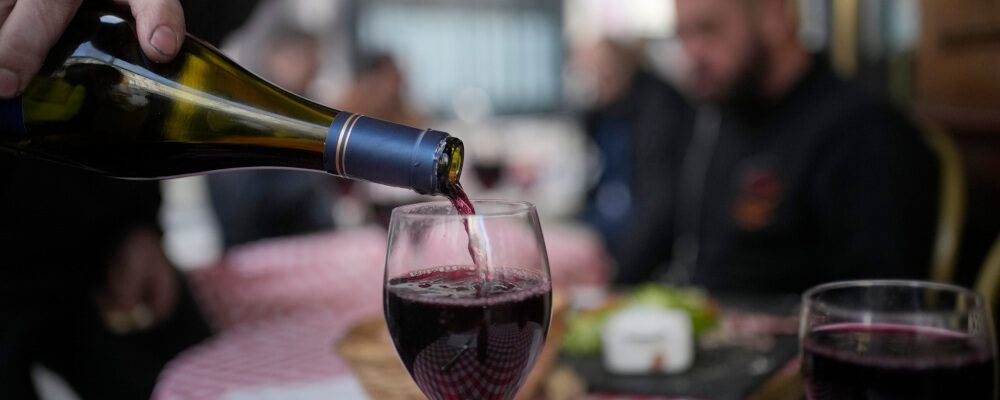Andrew Jefford has enjoyed an award-winning and prolific career as a wine writer. He’s published more than a dozen books, including 2002’s The New France: A Complete Guide to Contemporary French Wine, which heralded that country’s wine resurgence after decades of being overshadowed by the producers of The New World. His journalism has been published in the British press for three decades, most notably (for North American readers) in Decanter Magazine. He’s a big deal, but unless you’re a paid-up subscriber to one of the periodicals he contributes to, or attended this year’s International Cool Climate Chardonnay Celebration in Niagara, where he was the keynote speaker, you are forgiven for not being overly familiar with his work.
Or at least you are by me, since up until a week or so ago I’m not sure I had read him. That changed to my benefit after I sought out a copy of Drinking with the Valkyries: Writings On Wine, published this year by the Académie du Vin Library, a U.K.-based publishing house established by the late Steven Spurrier. The book is a collection of Jefford’s writing on wine between 2007 and this year, mostly, though not exclusively, in Decanter and The World of Fine Wine magazines. It is a tour de force, garnering praise and enthusiastic recommendations on both sides of the Atlantic. I’ll add mine.
Drinking with the Valkyries is very much, though not exclusively, a wine writer’s book. Jefford addresses the dilemmas and doubts of those who try and describe wines, armed only with metaphors. Most of the pieces involve some form of a lifting of the veil on the process of the craft, and it’s done with humility and dry wit. One of my favourite pieces in the collection is called “Some Useless Notes”, which describes his experience of attending the annual London tasting of the Domaine de la Romanée-Conti, the most sought-after Burgundy label, known mostly by its initials, DRC. Jefford contemplates writing about some of the world’s most expensive and hard-to-obtain wines, for which demand exponentially exceeds supply:
Those in a position to buy the wines, it seems to me, have absolutely no need for press guidance, since declining any proffered DRC would be the most financially stupid thing it is possible for a moneyed human being to do in a calendar year…It’s also affecting that the tasting happens at all, since there is assuredly no need for it; the wines would fly without any help from foil cutter or corkscrew.
Luckily, for his readers, Jefford is able to soldier on and provides us with spirited and detailed notes of the 2012 vintage. These are useful enough to anyone curious to know what happened. Not that Jefford’s focus is exclusively on fancy, Grand Cru wines. For instance, more than one piece sings praise for Madiran, the rustic red from the Southwest of France. Jefford’s impulse is democratic.
In a piece called “The Illuminati Of The Bottle”, Jefford criticizes what he calls “the machismo of wine” and the impulse of wine insiders to keep an exclusionary club, focused on specialized knowledge and obscure jargon:
The arcane language doesn’t help. It reinforces the idea that wine geeks are a kind of sect, the Illuminati of the bottle, who aren’t so much communicating with each other as exchanging secret codes. This, of course, is a source of public amusement out at the interface—but no more. That’s the pity of it. Once you’ve had a laugh at the language and the self-delight involved in retailing this body of arcana, wine geekdom is dissuasive. The initiated walk away, muttering ‘not for me’. The earnest, impressively researched blog posts go unread, save for other Illuminati.

Jefford aims his pen at other absurdities of the wine world and those that write about it. In essays like “The Curse Of The Vertical” and “Scored Rigid” he argues passionately against the reductive competition that the trade encourages. Still, he concedes in “Wine’s Transactional Flaw” that any discussion of wine will ultimately have to address its cost or price. Jefford is both a realist, for addressing all aspects of wine, including alcohol, and an idealist, for suggesting there ought to be “wine philanthropy” so more of us might taste rare wines.
Jefford is more than an essayist. He is also a published poet and this sensibility runs through Drinking with the Valkyries. He is a pleasure to read; a master of the English language whose meaning is always clear without being in any way dumbed down. He is also not beyond reverie for his favourite subject. In an essay called “Wine Is Also A Dream”, whose title quotes a remark made to him by the Rhône negociant Philippe Guigal, Jefford writes:
You could argue, in fact, that what matters most about wine—and all of the wine scrutinized and written about by wine writers—is its dream force. I’d define this as the ability to induce reverie, to inspire aspiration or hope, and to promise (even if it finally fails to deliver) exceptional sensual gratification. In other words, that which wine traders trade and wine collectors collect, and about which wine writers write, is not simply ‘also a dream’ but principally a dream.
Perhaps Jefford’s ultimate gift to his wine-loving reader is this articulation of what it is that makes us love wine so. Jefford seems to have never forgotten how magical the stuff in the glass is and that the point is to enjoy it. The first essay in Drinking with the Valkyries reminds us that humans were making wine before recorded history, and despite the periodic attempts to get people to stop drinking it, wine has endured over the millennia. There must be good reasons for that, and Jefford has found and enumerated most of them in this book that is quickly becoming required reading for those that care about wine and its many pleasures.




